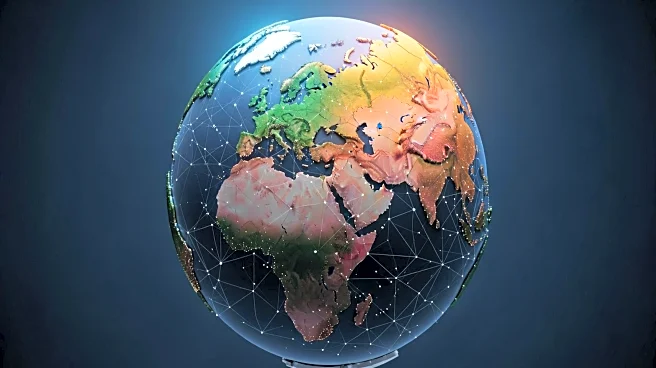What's Happening?
The concept of Eurasia as a geopolitical entity is gaining traction, driven by the disappearance of old ideological divides and the establishment of new trade links. This development is largely influenced
by China's Belt and Road Initiative, which aims to reshape the global political and economic order by connecting over 70 countries with investments nearing $4 trillion. The initiative is seen as a deliberate effort by China to assert control over global trade routes and infrastructure. As a result, Eurasia is emerging as a supercontinent extending from Lisbon to Shanghai, marking a new era of global integration. This shift is also prompting Russia to redefine its role, positioning itself as a central bridge between Europe and China.
Why It's Important?
The emergence of Eurasia as a geopolitical entity has significant implications for global politics and economics. It represents a shift towards a more integrated world where traditional Western dominance is challenged by rising Asian powers. This new alignment could lead to a balanced global order with Western and Asian poles deeply integrated, unlike the Cold War era. The Belt and Road Initiative, in particular, highlights China's growing influence and its confidence in building a modern society without adopting Western models. This development could redefine global trade patterns, economic alliances, and political strategies, affecting industries and governments worldwide.
What's Next?
As Eurasia continues to take shape, major powers like Russia and India will seek to position themselves within this new geopolitical landscape. The United States, observing from a distance, may adapt by selectively integrating different models to maintain its leadership role. The ongoing integration and contradiction within Eurasia could lead to a second age of globalization, where cultural and civilizational differences persist despite economic integration. Stakeholders, including political leaders and businesses, will need to navigate this complex environment, balancing cooperation and competition.
Beyond the Headlines
The rise of Eurasia as a geopolitical entity underscores the enduring cultural and civilizational differences that persist despite economic integration. This development challenges the notion of a single global model, highlighting the importance of understanding and respecting diverse cultural identities. The integration of Eurasia could also lead to ethical and legal challenges, as countries navigate issues related to sovereignty, trade regulations, and human rights. Long-term, this shift could redefine global power dynamics, with implications for international law, diplomacy, and cultural exchange.









